| |
| |
| |
| Presented By Global X ETFS |
| |
| Axios World |
| By Dave Lawler · Aug 11, 2022 |
| Welcome back to Axios World. - Tonight's edition (1,875 words, 7 minutes) starts in Ukraine. On Monday, we'll be focusing on Afghanistan a year on from the fall of Kabul. Any thoughts or suggestions, just hit reply.
- ICYMI: There was some big news in Axios world this week. Axios World will, of course, continue uninterrupted.
New arrival? Subscribe. |
| |
| |
| 1 big thing: Explosions in Crimea |
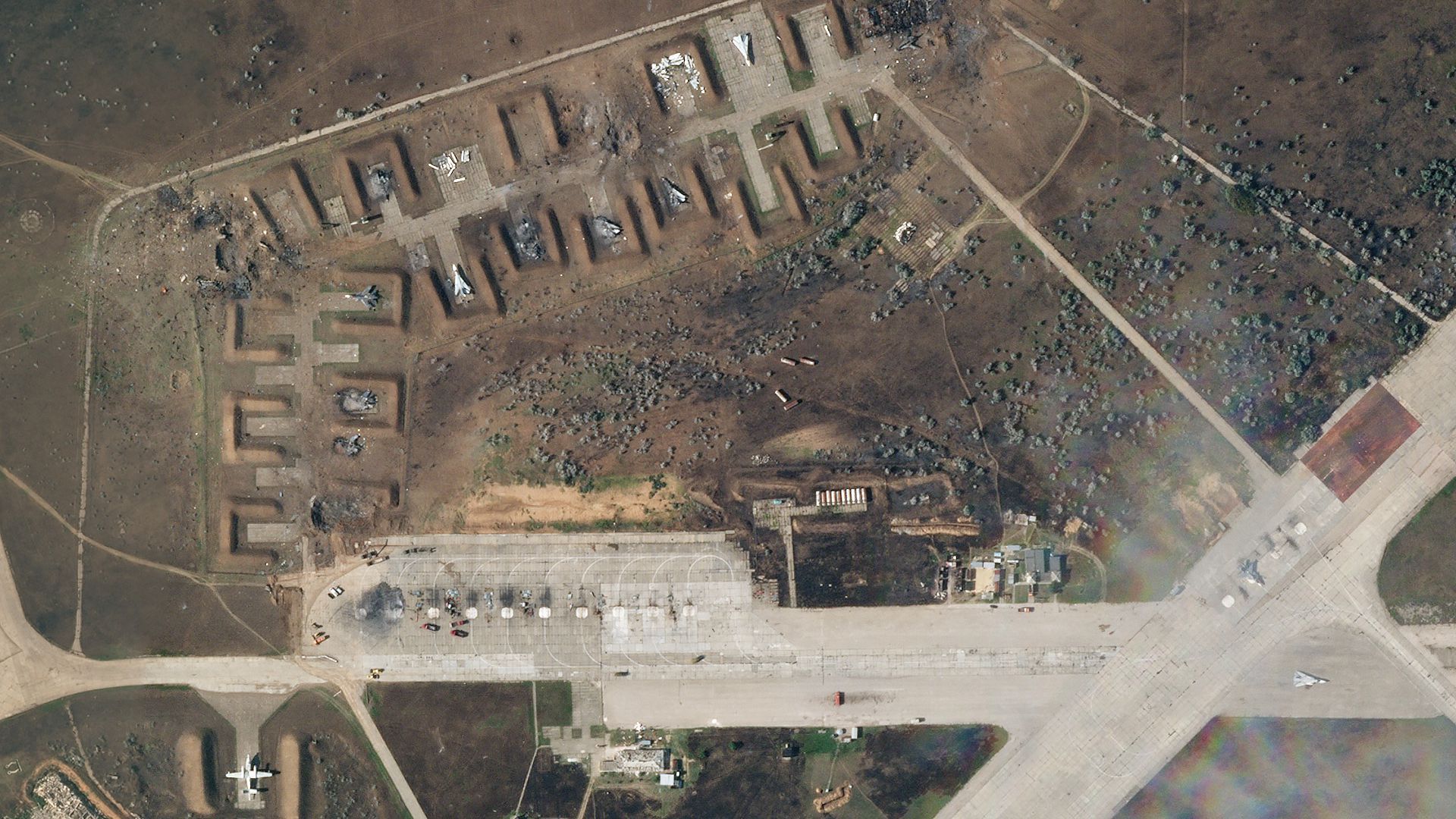 |
|
| A satellite image captured on Aug. 10 shows the aftermath of explosions at Russia's Saki Air Base in southwest Crimea. Satellite photo: Planet Labs PBC |
| |
| A series of explosions this week at a Russian military base on the Crimean coast carries major symbolic and strategic ramifications for both Ukrainian President Volodymyr Zelensky and Russian President Vladimir Putin. Why it matters: Satellite images appear to confirm that the explosions — which sent frantic Russian tourists scrambling off a nearby beach — badly damaged several Russian warplanes. - The explosions will likely inject a new sense of vulnerability into Russia's use of Crimea as its transport and logistics hub while it braces for a Ukrainian offensive in Kherson, to the north of Crimea.
- Russia has routed thousands of troops from the Donbas, via Crimea, to reinforce its positions in southern Ukraine.
- The explosions also brought the war home to a small sliver of Russia's civilian population. Videos of traffic jams on the bridge connecting the peninsula to Russia — presumably as Russian tourists abandoned their vacations — were shared online.
State of play: Ukraine has not officially claimed or denied responsibility for the explosions, but an unnamed Ukrainian official told the Washington Post the attack was carried out by special forces operating behind the Russian lines. - Meanwhile, Reuters speculates that these were long-range strikes, potentially indicating a new Ukrainian capability "with potential to change the course of the war." That's all unconfirmed.
- Moscow, however, said this was all just a minor ammunition explosion — a claim belied by satellite images and mocked by Ukraine's Ministry of Defense, which released a video advising Russians to choose a vacation destination other than Crimea, which will be "unpleasantly hot."
- Asked what he thought of the explosions, Ukrainian Cpl. Andrii Shadrin — who is from Crimea and has been corresponding with Axios while fighting in the Donbas — repurposed a recent quote from Putin: "I think, 'we have not even begun.'"
- If Ukrainian forces were indeed behind the explosions, the strikes would be the first major attack inside Crimea, which Russia occupied in 2014, since the war began.
The most significant remark came from Zelensky, who proclaimed Tuesday that the war must end with the "liberation" of Crimea. Between the lines: Zelensky previously acknowledged in an interview with Axios that attempting to take Crimea by force could result in "hundreds of thousands" of casualties, a price he implied would be too high. - While Ukraine is unlikely to launch a full-scale operation to retake the peninsula, some officials and analysts worry that such statements could set unrealistic expectations for any eventual peace deal.
- While Crimea has major symbolic resonance for Ukrainians, it's also one of Putin's crowning achievements and not one he'd abandon easily.
What to watch: Both Ukraine and Russia are building up their forces near Kherson in expectation of a major new phase of fighting there. Russia's offensive in the east appears to have slowed as the focus shifts south. - In the meantime, Ukraine has been using U.S.-provided HIMARS rocket systems to destroy bridges and Russian supply depots.
Meanwhile: The UN and G7 are sounding the alarm over shelling near the Zaporizhzhia nuclear power plant, also in southern Ukraine. - UN Secretary-General António Guterres today reiterated his call for an immediate cessation of fighting in the area, which he has called "suicidal." Russia and Ukraine blame one another.
- Russian forces captured the plant in March and have reportedly forced its Ukrainian staff to keep it operating. The head of the UN's nuclear watchdog has warned that the plant is "out of control" and requested immediate access to inspect it.
|
    |
| |
| |
| 2. Iran deal part I: The "final text" is on the table |
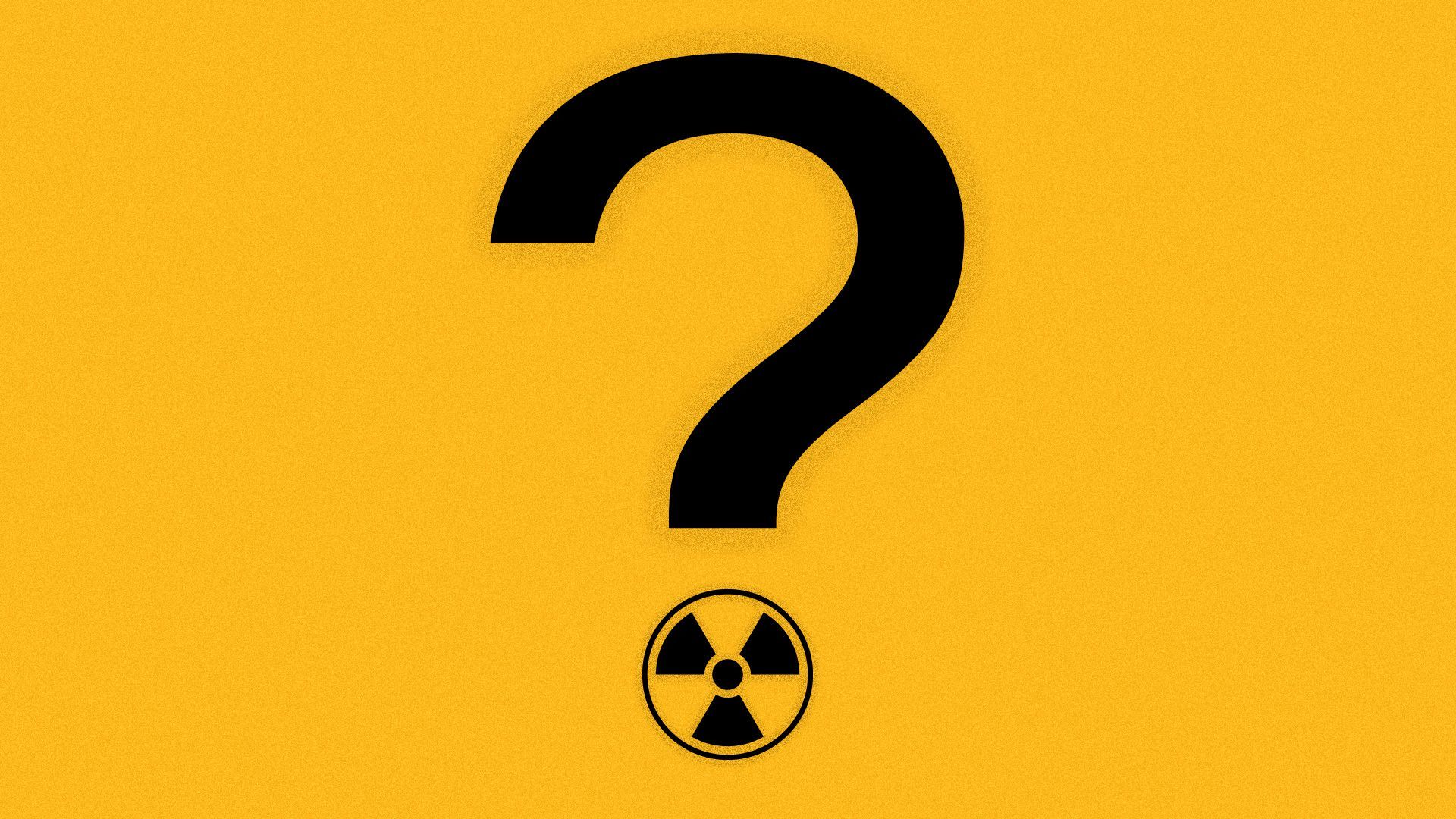 |
|
| Illustration: Aïda Amer/Axios |
| |
| EU mediators have submitted the "final text" of a nuclear agreement to Iran and the other signatories of the 2015 deal, and they have requested a "yes" or "no" by Monday, the WSJ's Laurence Norman reports. Why it matters: Europe's top diplomats have described this updated text and the latest round of talks in Vienna as a final push to get the deal across the line. - Per Norman, the text includes a concession around the handling of an ongoing investigation into undeclared nuclear material in Iran. The deal's signatories would urge the UN to close it if Iran offers certain clarifications.
- Iran has reportedly made concessions of its own, dropping its demands that the U.S. remove the Islamic Revolutionary Guard Corps from a terror blacklist and provide written guarantees that no future U.S. president will withdraw from the deal.
Yes, but: Iran has also indicated that more talks might be needed, despite the EU's insistence that the text is final. - U.S. officials have been insisting for months that the window to save the deal is almost closed. They remained pessimistic heading into the latest round of talks.
- Still, the new concessions could suddenly make a revival of the deal — which seemed extremely unlikely just a week ago — a real possibility.
|
    |
| |
| |
| 3. Part II: Ernest Moniz on the "no deal" scenario |
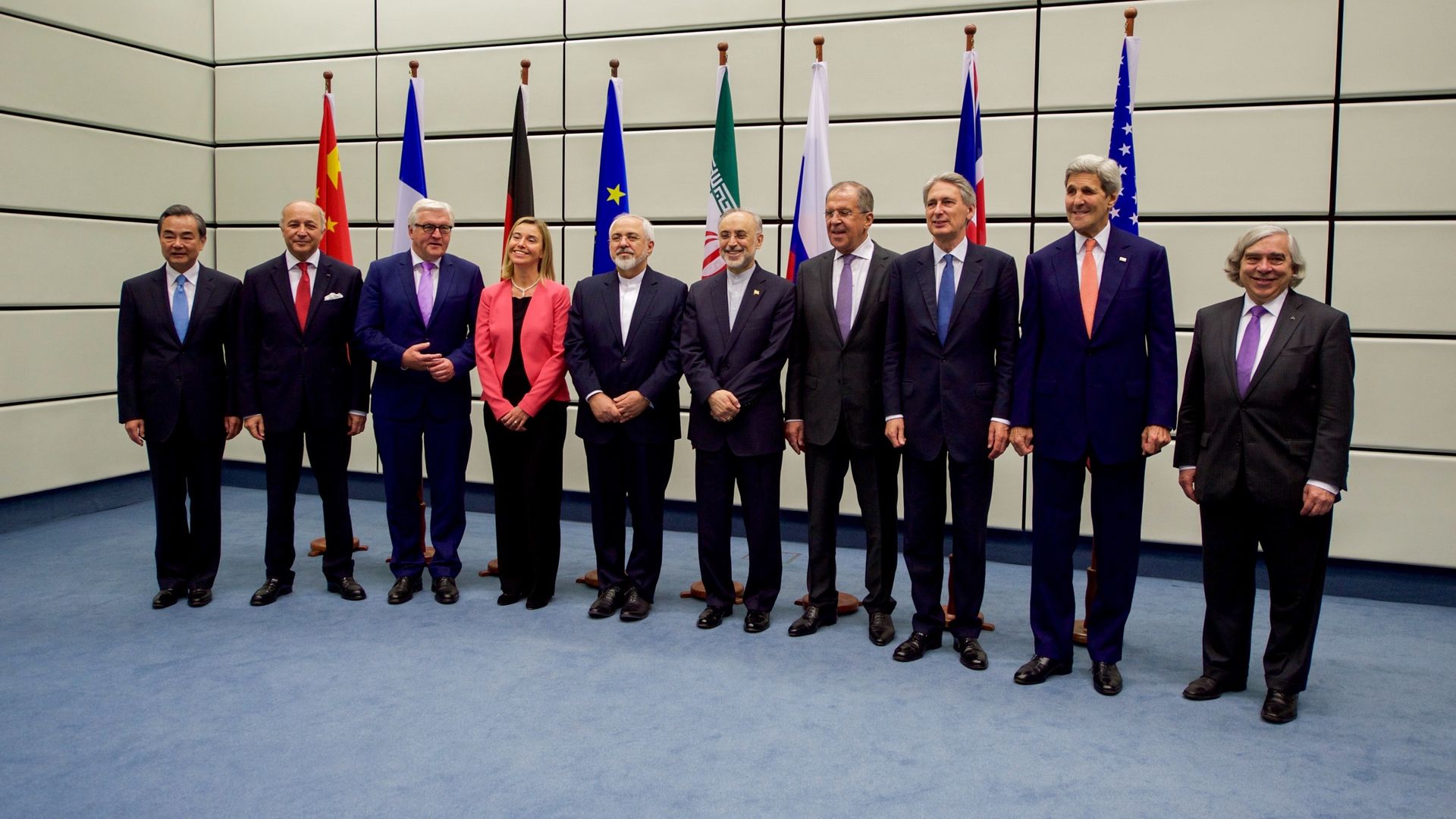 |
|
| Moniz (right) and his fellow nuclear negotiators in 2015. Photo: Hasan Tosun/Anadolu Agency/Getty Images |
| |
| I spoke last week to Ernest Moniz, who helped negotiate the 2015 deal as Barack Obama's energy secretary, about the potential paths forward. What he's saying: Even if the deal is restored, Moniz says, it will be difficult if not impossible to regain the "continuity of knowledge" around Iran's nuclear program that was lost after Tehran stopped complying. - "Without that continuity of knowledge, we're kind of back to square one in terms of whether or not Iran could be pursuing a covert weapons program," Moniz says.
- The original deal was based on the idea that if Iran was caught cheating, it would face "even greater sanctions," Moniz says. In the wake of Donald Trump's withdrawal, "we would have a devil of a time restoring the international coherence that's important for effective sanctions."
- The "runway" to implement a deal before another president could rip it up is getting short, Moniz notes, and the political climates in both Tehran and Washington are unfavorable, particularly around the midterms.
But things won't get any easier in a "no deal" scenario. Moniz says the administration could either "go small" or "try to roll the dice for a broader agreement." - "Smaller would mean finding some limited subset of the JCPOA in return for a more limited relaxation of sanctions. I would prioritize something that really improves the transparency and monitoring situation ... get all the cameras working, all of that."
- "Or you go big, which means having to address — in addition to the nuclear issue — the regional geopolitical situation that Iran fans the flames of." Such a deal currently looks a long way off.
- Then there's the possibility of military action to stop Iran from producing a nuclear weapon. Such a scenario could quickly lead to broader military escalation, Moniz warns.
|
    |
| |
| |
| A message from Global X ETFS |
| The rise of cyber threats is not just a news story, it's a reality |
| |
 |
| |
| If we're lucky, cybersecurity can feel like an afterthought. But as the world continues to digitalize, more of our data and devices are potentially at risk. Explore the Global X Cybersecurity ETF (BUG) for exposure to companies preventing intrusions and attacks — all in single trade. Explore BUG. |
| |
| |
| Bonus: Where in the world? |
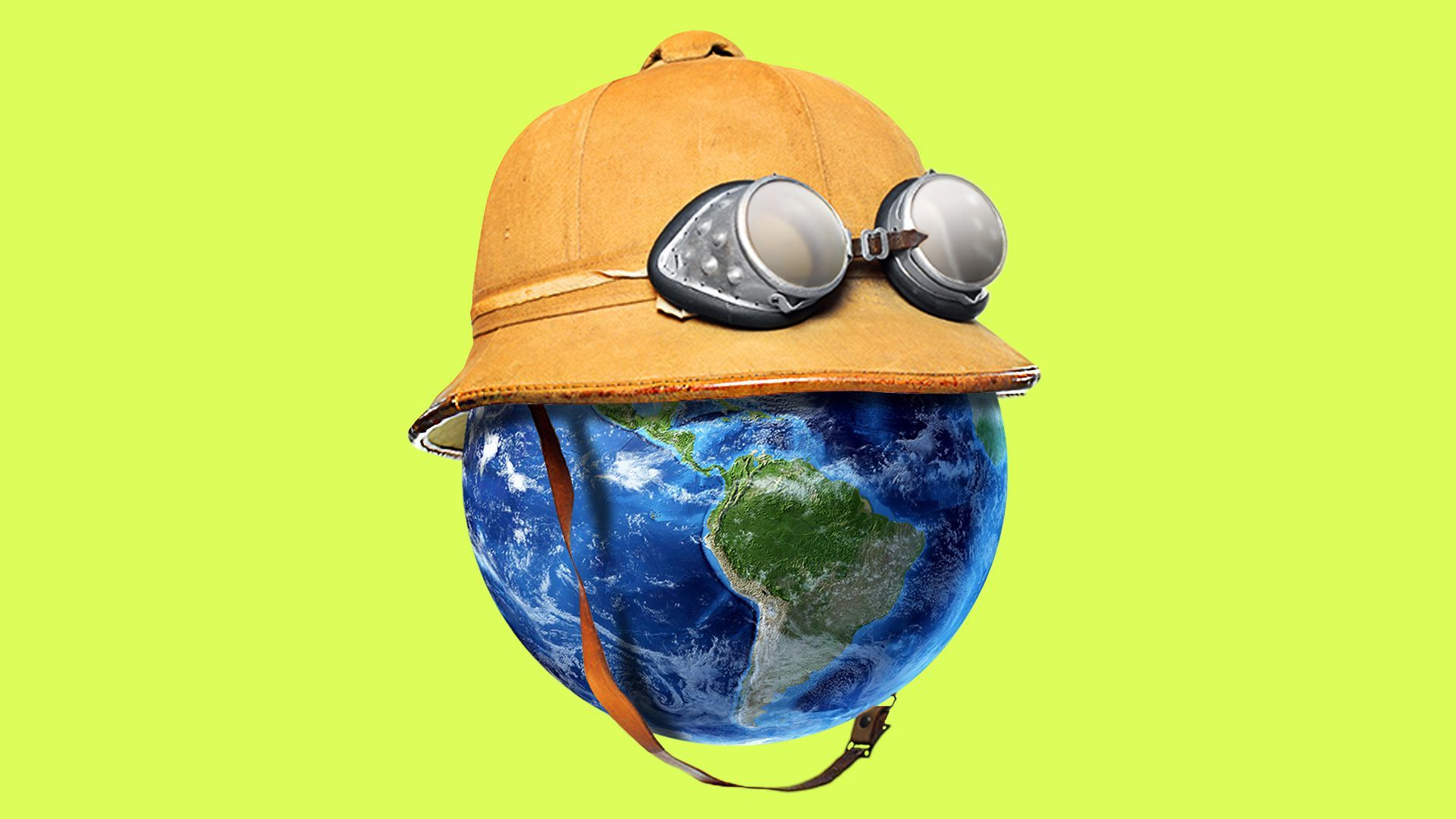 |
|
| Illustration: Natalie Peeples/Axios |
| |
| I've got another puzzle for you today. Can you name the two countries to which all five clues apply? - Shares a land border with only one other country, and that country is NOT the United States (16 countries left — sorry Canada).
- Has a population of at least 1 million (11 countries left).
- NOT an island country (5 countries left).
- Has a monarchy (3 countries left).
- One of the world's 20 richest countries, in GDP per capita (2 countries left).
*I'm excluding overseas territories here. So the border between French- and Dutch-held Saint Martin would not count, for example. Scroll to the bottom for the answer. |
    |
| |
| |
| 4. Global news roundup |
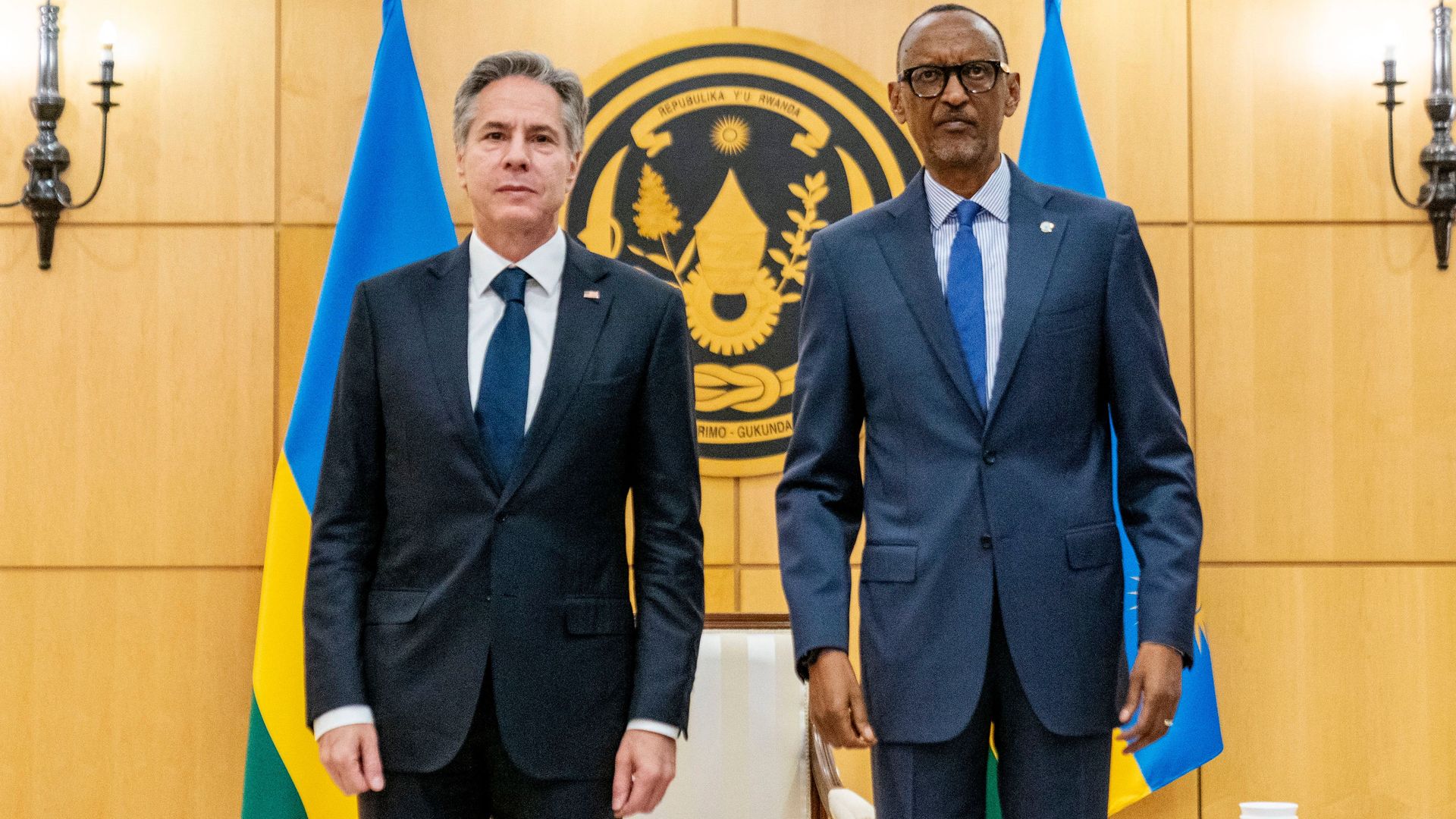 |
|
| All smiles in Kigali as Secretary of State Blinken meets Rwandan President Kagame. Photo: Andrew Harnik/Pool via Getty |
| |
| 1. At least 27 people — six police and 21 protesters — died during anti-government protests that began yesterday in Sierra Leone's capital, Reuters reports. An uneasy calm returned today after the government imposed an indefinite curfew and cut the internet. - The big picture: The West African country is the latest in a string of countries to face unrest over the rising cost of living.
2. Former Secretary of State Mike Pompeo was told by the Justice Department that he was a second target of a plot, revealed Wednesday, by an Iranian operative to murder former Trump administration national security adviser John Bolton, Axios' Mike Allen reports. - Driving the news: The DOJ unsealed charges against Shahram Poursafi, the member of Iran's Islamic Revolutionary Guard Corps who allegedly sought to commission the assassination attempts.
- Worth noting: Bolton told CNN he found the $300,000 bounty on his head insultingly low.
3. Chinese President Xi Jinping is expected to visit Saudi Arabia next week, the Guardian's Martin Chulov reports, in what would be his first trip outside mainland China since the pandemic began, aside from a visit to Hong Kong. - The intrigue: Unlike President Biden's "low-key reception," Xi is "expected to receive a bells-and-whistles welcome intended to consolidate ties between Beijing and Riyadh and reinforce the image of China as an ally of Saudi Arabia."
4. Secretary of State Tony Blinken visited Rwanda today and said he'd raised "credible reports" that Rwanda was supporting rebels in Eastern Congo with President Paul Kagame. He also visited a memorial to the 1994 genocide. 5. William Ruto is leading Raila Odinga with just over half of the (preliminary) results in from Kenya's presidential election. |
    |
| |
| |
| 5. Data du jour: The pandemic divide |
 Data: Pew Research Center; Chart: Simran Parwani/Axios Majorities across 15 of 19 wealthy democracies polled by Pew feel the pandemic has left their country more divided, with the U.S. leading the way. The exceptions are interesting. - Sweden's laissez-faire approach to lockdowns took some criticism, but 60% of Swedes say the pandemic united the country.
- Japanese respondents are among the most likely to think their country mishandled the pandemic, but also among the least likely to consider it divisive.
- Singaporeans overwhelmingly believe their country handled the pandemic well and that it united the country. Malaysians do too, by somewhat smaller margins.
Worth noting: 58% of Americans now believe their country handled the pandemic well, up from 42% a year ago. Similar jumps were seen in most of the European countries. - The percentage of Australians who feel that way fell from 95% to 76%.
Full survey and methodology. |
    |
| |
| |
| 6. What I'm reading: Slow-playing the lithium boom |
 |
|
| A worker at an Albemarle Corp. lithium mine in Calama, Chile. Photo: Cristobal Olivares/Bloomberg via Getty Images |
| |
| Lithium, a key ingredient for batteries for electric vehicles and other products, has never been more in demand. Why it matters: More than half of the world's known deposits sit near the intersection of Chile, Bolivia and Argentina. But leftist governments in those countries — citing indigenous rights, environmental concerns and the need for more state control — are "stifling production," Ryan Dube reports for the WSJ. - Chile has the world's largest known reserves and was until recently the No. 1 lithium producer. But while production is gradually expanding there, it's exploding in Australia (which is now No. 1).
- Chile's Supreme Court recently threw out a contract for a Chinese company to mine lithium in the Atacama Desert because Indigenous groups weren't consulted. Now, President Gabriel Boric wants to create a state lithium company.
- Bolivia nationalized lithium in 2008 but has yet to produce significant amounts.
💬 My thought bubble: Advanced batteries are crucial to the transition away from fossil fuels. But the scramble to mine the elements needed to make them is itself environmentally destructive. Keep an eye on that tension in the coming years. |
    |
| |
| |
| 7. Stories we're watching |
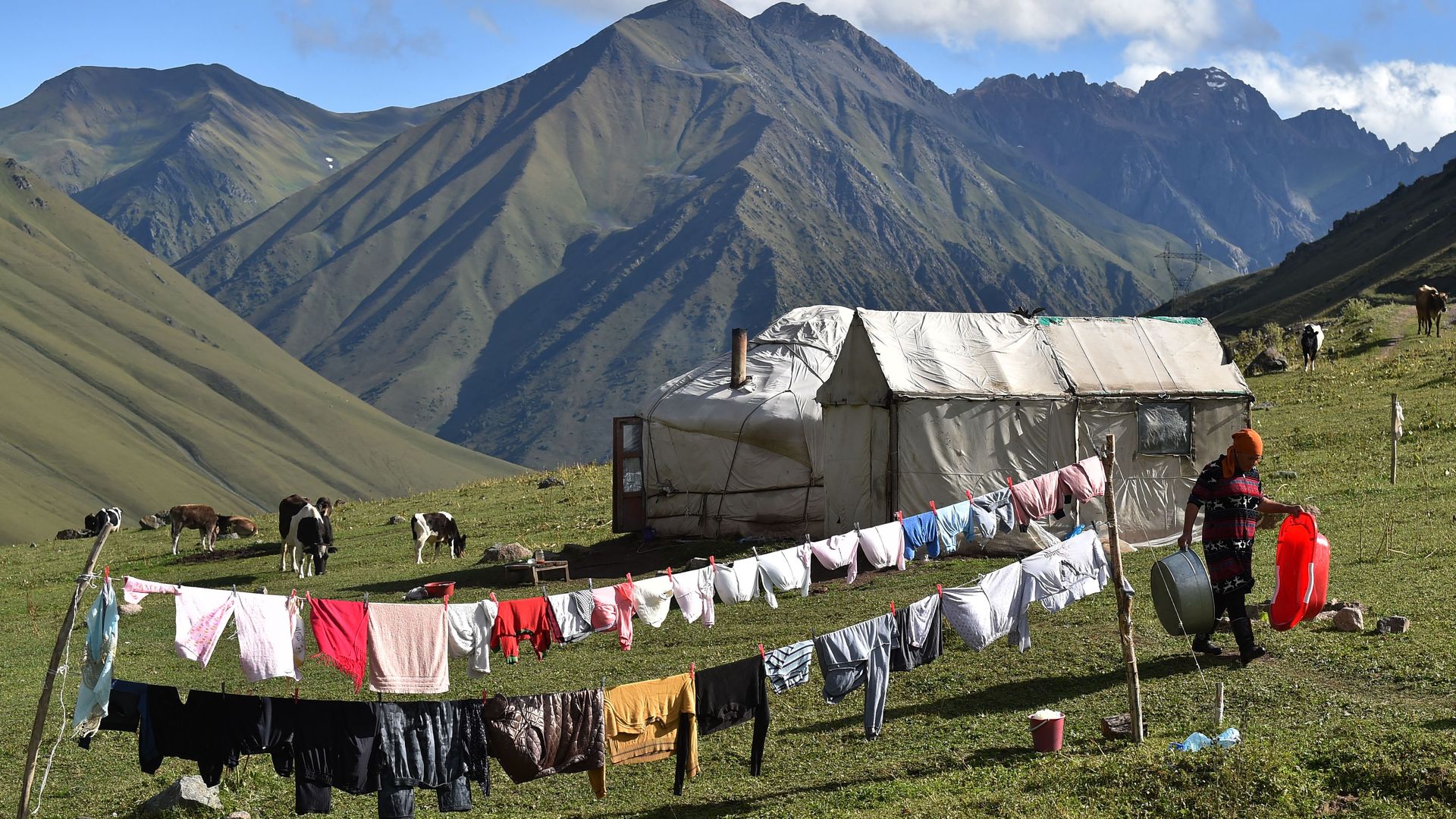 |
|
| Doing the washing, on the Suusamyr Plateau in Kyrgyzstan. Photo: Vyacheslav Oseledko/AFP via Getty |
| |
- Dozens missing after migrant boat sinks off Greece
- Taiwan latest: Beijing removes pledge not to send troops; Pelosi says Xi "acting like a scared bully"; Nationalism rules China's internet
- Drought threatens 60% of EU and U.K.
- Africa CDC in talks for monkeypox vaccines
- Russia confirms prisoner swap talks for Griner, Whelan
- McDonald's to reopen in Ukraine
- Inside Japan's national obsession with baseball
Quoted: "Even though he was seriously ill with a high fever, he could not lie down for a moment thinking about the people he had to take care of until the end in the face of the anti-epidemic war." — Kim Jong-un's sister, apparently describing the leader's battle with COVID-19 |
    |
| |
| |
| A message from Global X ETFS |
| The rise of cyber threats is not just a news story, it's a reality |
| |
 |
| |
| If we're lucky, cybersecurity can feel like an afterthought. But as the world continues to digitalize, more of our data and devices are potentially at risk. Explore the Global X Cybersecurity ETF (BUG) for exposure to companies preventing intrusions and attacks — all in single trade. Explore BUG. |
| |
| Answers: Denmark and Qatar |
 | | Are you a fan of this email format? It's called Smart Brevity®. Over 300 orgs use it — in a tool called Axios HQ — to drive productivity with clearer workplace communications. | | |
No comments:
Post a Comment